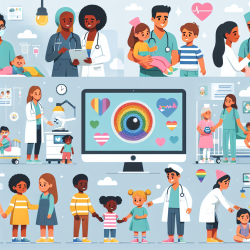Understanding LGBTQ Cultural Competency in Pediatric Healthcare
In the ever-evolving field of healthcare, it is crucial to ensure that all patients receive culturally competent care. This is especially important for LGBTQ youth, who often face unique challenges and health disparities. A recent study, "Perioperative Provider and Staff Competency in Providing Culturally Competent LGBTQ Healthcare in Pediatric Setting," sheds light on the importance of cultural competency training for healthcare providers.
The Importance of Cultural Competency
Children and adolescents identifying as LGBTQ may feel reluctant to seek medical care due to stigma and potential negative interactions with healthcare providers. This reluctance can lead to delayed or avoided healthcare, exacerbating existing health disparities. The study conducted by Walia et al. highlights the need for healthcare providers to be trained in cultural competency to address these issues effectively.
Key Findings from the Study
The study involved surveys conducted before and after a two-part educational series among pediatric perioperative staff. The results showed that while self-reported knowledge and comfort levels were high even before the training, objective assessments revealed significant improvements in knowledge after the training.
- Before training, median ratings of knowledge and comfort were 3 or 4 out of 5.
- Objective knowledge scores improved from a median of 5 to 6 out of 7 after training (p=0.011).
Implementing Cultural Competency Training
For practitioners looking to improve their skills in providing culturally competent care, the following steps are recommended:
- Participate in educational series or workshops focused on LGBTQ cultural competency.
- Engage in case studies and clinical scenarios to better understand the unique needs of LGBTQ patients.
- Foster an inclusive and safe clinical environment to facilitate open discussions about sexual orientation and gender identity.
Encouraging Further Research
While the study provides valuable insights, it also highlights the need for ongoing research and education. Practitioners are encouraged to explore further studies and training opportunities to continue improving their competency in this area.
To read the original research paper, please follow this link: Perioperative Provider and Staff Competency in Providing Culturally Competent LGBTQ Healthcare in Pediatric Setting.










